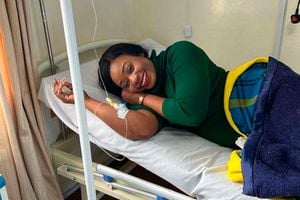Making cancer treatment accessible in Kenya

Breast cancer is the leading cause of cancer-related mortalities among women.
What you need to know:
- The top three cancers in men are prostate cancer with a prevalence of 21.9 per cent, followed by oesophageal cancer at 8.7 per cent and colorectal cancer at 8.3 per cent.
- With cancer cases now on the rise, it is estimated that the burden of cancer in Kenya could increase by 62.7 per cent to about 77,894 cases annually by 2030
Cancer is the third leading cause of death in Kenya after infectious and cardiovascular diseases, and according to data released by the Ministry of Health, the annual cancer incidence rate has risen to nearly 42,116 cases with 15,566 (male) and 26,550 (female) new cases.
The annual mortality rate is now over 27,092 with 10,466 (male) and 16,626 (female) deaths. The three most common cancers in women are breast, cervical and oesophageal cancers with incidences of 25.6 per cent, 19.7 per cent and 6.1 per cent respectively. The top three cancers in men are prostate cancer with a prevalence of 21.9 per cent, followed by oesophageal cancer at 8.7 per cent and colorectal cancer at 8.3 per cent. Medics now say they are noticing a younger demographic also testing positive for cancer, not only in Kenya but globally.
With cancer cases now on the rise, it is estimated that the burden of cancer in Kenya could increase by 62.7 per cent to about 77,894 cases annually by 2030. While diagnosis is the entry point to cancer care, lack of early or frequent screening is one of the major contributors that has led to many cancer cases being detected at an advanced stage, reducing a patient's chances of survival.
This is because 70 per cent of reported cancer cases in Kenya are detected at an advanced stage in the country's limited infrastructure. There is a lack of human resources and the cost of treatment is high.
Speaking to the Nation, Dr Denis Lumumba from Ruai Family Hospital says most Kenyans often avoid going to the hospital for regular check-ups, opting instead for over-the-counter medication.
"For example, gastric cancer, which is prevented very vaguely, the symptoms can mimic heartburn, fullness in the stomach or nausea, most people then take antacids from the chemist without thinking it could be something serious until three years down the line when the full-blown symptoms present themselves and when they go to the hospital, that is when the journey begins.
The other thing we have noticed is that some Kenyans are also opting for traditional or herbal medicines. Says Dr Lumumba.
RFH Chief Executive Officer, Maxwell Okoth, said the hospital embarked on a journey two years ago to fight cancer and give patients more options for cancer treatment. In this regard, the hospital has acquired a PET-CT and SPECT-CT scanner in the country to offer a variety of treatment options.
"Together with our sponsors, we are in the process of commissioning chemotherapy, radiotherapy and brachytherapy. I am glad that our patients now have treatment options available to them. These advanced technologies will enable us to diagnose and treat cancer more effectively. We are looking for ways to make cancer treatment more affordable than ever before. We urge them to come for treatment early when we can treat and cure cancer," said Dr Okoth.
“The current treatment facilities that we have as a country are mostly centralised in Nairobi and we lack resources in the counties for treatment, so you find that a patient is often referred from different counties to come to Nairobi for treatment, then you also find that this creates a huge backlog of patients waiting for treatment," says Dr Lumumba.
Other stakeholders believe that Kenya is still not where it should be in terms of awareness and screening, especially in rural areas.
“The stigma that is associated with cancer is huge and most people think that cancer is a death sentence. I want to tell people that cancer is not a death sentence if caught early that is why I would urge Kenyans not to ignore any symptom or to self-medicate but to go to a hospital for a checkup,” says Dr Lalit Varadpande who is a medical Oncologist at the Nairobi West Hospital.
Healthcare Financing has proven to be a challenge in the country with data by the Kenya Health Demographic Survey indicating that at least 26 per cent of Kenyans are insured meaning many Kenyans are forced to dig deeper into their own pockets for cancer treatments within the country.




